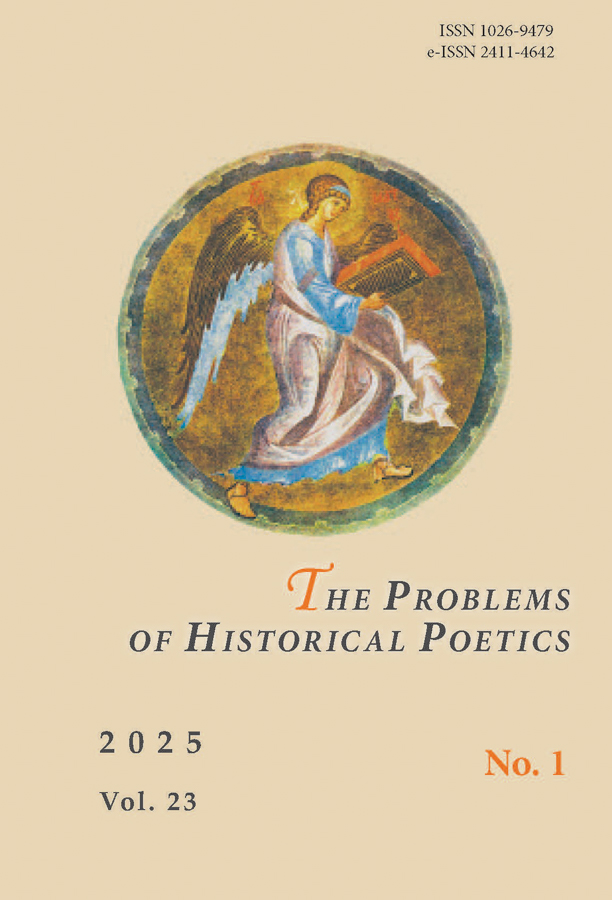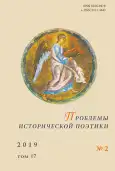The chronotope of the short novel by V. Rasputin “Farewell to Matyora”: its ethnopoetic aspect
- Authors: Yureva O.Y.1
-
Affiliations:
- Irkutsk State University
- Issue: Vol 17, No 2 (2019)
- Pages: 290-313
- Section: Articles
- URL: https://journal-vniispk.ru/1026-9479/article/view/293086
- DOI: https://doi.org/10.15393/j9.2019.6682
- ID: 293086
Cite item
Full Text
Abstract
The analysis of the artistic originality of V. G. Rasputin’s novel “Farewell to Mаtyora” in the aspect of ethnopoetics reveals the ideas of “soil- bound” tradition that became the basis of the aesthetics and axiology of his works. The spatial and temporal coordinates and loci of the story present the essence of the global conflict: eternity and modernity, culture and civilization, nature and man, the good and the evil. The chronotope of the story as an expression of the national picture of the world is presented in the conflict of the sacral and profane spaces in modern times. The sacral space and time are a synthesis of natural and human existence and has corresponding coordinate axes: the vertical one is the “Royal listven” and a church, the horizontal one is Angara and Matyora. The name of the island and the village has several semantic meanings: mother, mother-lend, mother-homeland, omnipotent, continent, spiritual continent, peasant Atlantean. Matyora as part of the national Cosmo- Logos is presented in a mythopoetic perspective as a living, intelligent, sensitive being, whose soul is the zoomorphic image of the “Owner of the island”. The image of the Angara river as the most important horizontal sacred topos, organizing the chronotope of the story, incorporates the national archetypal connotations of the river-life, the river-road, the river-movement, acquires the strongly marked symbolic semantics of time, which is associated with the tragic collision of the onset of the “last times”. The image of the “Royal listven”, that organizes the vertical axis of the chronotope, incorporates the features of the archetype of the world tree and the national totem, symbolizing the indestructibility of eternal nature, the short-term “Pyrrhic victory” of man. The profane space is marked by images of the “lower”, infernal world and a binary opposition “Owner/time-traveler”. The poetics of the story has a strongly-pronounced Orthodox code, which gives to the finale of the story a truly apocalyptic sound.
Keywords
About the authors
Olga Yu Yureva
Irkutsk State University
Author for correspondence.
Email: yuolyu@yandex.ru
Doctor of Philology, Professor, Head of the Department of Philology and Methodology
Russian Federation, ul. Кarla Маrksa 1, Irkutsk, 664003References
- Afanas’eva-Medvedeva G. V. Narodnoe slovo v rasskazakh i povestyakh Valentina Rasputina: slovar’: v 2 tomakh [A Folk Word in the Stories and Short Novels of Valentin Rasputin: Dictionary: in 2 Vols]. Irkutsk, 2017, vol. 1. 432 p. (In Russ.)
- Galimova E. Sh. An Archetypal Image of the River in the Artistic World of Valentin Rasputin. In: Vremya i tvorchestvo Valentina Rasputina: materialy Mezhdunarodnoy nauchnoy konferentsii, posvyashchennoy 75-letiyu so dnya rozhdeniya Valentina Grigor’evicha Rasputina [The Time and Works of Valentin Rasputin: Proceedings of International Scientific Conference Dedicated to the 75th Anniversary of the Birth of Valentin Rasputin]. Irkutsk, Irkutsk State University Publ., 2012, pp. 98–109. (In Russ.)
- Esaulov I. A. The Category of Sobornost’ in Russian Literature (Problem Statement). In: Problemy istoricheskoy poetiki [The Problems of Historical Poetics]. Petrozavodsk, PetrSU Publ., 1994, issue 3, pp. 31–60. Available at: http://poetica.pro/journal/article.php?id=2372 (accessed on March 10, 2019). doi: 10.15393/j9.art.1994.2372 (In Russ.) (a)
- Esaulov I. A. Axiology of Literary Criticism: Concept Establishment Experience. In: Problemy istoricheskoy poetiki [The Problems of Historical Poetics]. Petrozavodsk, PetrSU Publ., 1994, essue 3, pp. 377–383. Available at: http:// poetica.pro/journal/article.php?id=2435 (accessed on March 10, 2019). doi: 10.15393/j9.art.1994.2435 (In Russ.) (b)
- Zakharov V. N. Russian Literature and Christianity. In: Problemy istoricheskoy poetiki [The Problems of Historical Poetics]. Petrozavodsk, PetrSU Publ., 1994, issue 3, pp. 5–11. Available at: http://poetica.pro/journal/article.php?id=2370 (accessed on March 10, 2019). doi: 10.15393/j9.art.1994.2370 (In Russ.)
- Zakharov V. N. Pochvennichestvo in Russian Literature: the Metaphor as Ideologeme. In: Problemy istoricheskoy poetiki [The Problems of Historical Poetics]. Petrozavodsk, PetrSU Publ., 2012, issue 10, pp. 14–24. Available at: http://poetica.pro/files/redaktor_pdf/1457946697.pdf (accessed on March 11, 2019). doi: 10.15393/j9.art.2012.335 (In Russ.)
- Zyryanov O. V. A Problem-Methodological Field of Contemporary Ethno- poetics. In: Filologicheskiy klass, 2019, no. 1 (55), pp. 8–15. (In Russ.)
- Imikhelova S. S. The Image-symbol of the Angara River in the Prose of V. Rasputin. In: Tvorcheskaya lichnost’ Valentina Rasputina: zhivopis’ — chuvstvo — mysl’ — voobrazhenie — otkrovenie [An Artistic Personality of Valentin Rasputin: Painting — Feeling — Thought — Imagination — Revelation]. Irkutsk, 2015, pp. 267–276. (In Russ.)
- Kovtun N. V. From “Farewell to Mаtyora” to “Inundation Area”: a Prognostic Result of the Myth of Rasputin about Russia. In: Valentin Rasputin. Pravda pamyati: materialy Vserossiyskoy konferentsii, posvyashchennoy 80-letiyu so dnya rozhdeniya pisatelya [V. Rasputin. The Truth of Memory: Proceedings of the all-Russian Conference Dedicated to the 80th Anniversary of the Writer’s Birth]. Irkutsk, Irkutsk State University Publ., 2018, pp. 151–167. (In Russ.)
- Kurbatov V. Every Day from the Beginning. In: Soglasie, 1991, no. 3, pp. 215–221. (In Russ.)
- Kurbatov V. A Word about Valentin Rasputin. In: Russkaya provintsiya, 2000, no. 3, pp. 3–16. (In Russ.)
- Plekhanova I. I. The Ideas of Religious and Moral Philosophy in Political Essays of V. Rasputin. In: Tri veka russkoy literatury: aktual’nye aspekty izucheniya: materialy Mezhdunarodnoy nauchnoy konferentsii, posvyashchennoy 70-letiyu V. G. Rasputina [Three Centuries of Russian Literature: Topical Aspects of the Study: Proceedings of the International Scientific Conference Dedicated to the 70th Anniversary of V. G. Rasputin]. Moscow, Irkutsk, Irkutsk State University Publ., 2007, issue 16, pp. 308–333. (In Russ.)
- Rasputin V. Upstream and Downstream. In: Priroda i chelovek, 1984, no. 11, pp. 32–34. (In Russ.)
- Rasputin V. “The Right or Left-Side. Where is It?”. In: Nash sovremennik, 1989, no. 11, pp. 140–161. (In Russ.)
- Rasputin V. G. Sobranie sochineniy: v 3 tomakh [Collected Works: in 3 Vols]. Moscow, Molodaya Gvardiya Publ., Veche Publ., 1994, vol. 3. 495 p. (In Russ.)
- Rasputin V. V poiskakh berega: Povest’, ocherki, stat’i, vystupleniya, esse [In Search of the Shore: Novel, Sketches, Articles, Speeches, Essays]. Irkutsk, Izdatel’ Sapronov Publ., 2007. 528 p. (In Russ.)
- Rasputin V. U nas ostaetsya Rossiya: Ocherki, esse, stat'i, vystupleniya, besedy [We still Have Russia: Sketches, Essays, Articles, Speeches, and Discussions]. Moscow, the Institute of Russian Civilization Publ., 2015. 1200 p. (In Russ.)
- Rybal’chenko T. L. Intuition of the Metaphysical in V. Rasputin’s Prose. In: Tri veka russkoy literatury: aktual’nye aspekty izucheniya: materialy Mezhdunarodnoy nauchnoy konferentsii, posvyashchennoy 70-letiyu V. G. Rasputina [Three Centuries of Russian Literature: Topical Aspects of the Study: Proceedings of the International Scientific Conference Dedicated to the 70th Anniversary of V. G. Rasputin]. Moscow, Irkutsk, Irkutsk State University Publ., 2007, issue 16, pp. 6–25. (In Russ.)
- Yur’eva O. Yu. The Etnotipology of Dostoevsky in the Works of V. Rasputin. In: Tri veka russkoy literatury: aktual’nye aspekty izucheniya: materialy Mezhdunarodnoy nauchnoy konferentsii, posvyashchennoy 70-letiyu V. G Rasputina [Three Centuries of Russian Literature: Topical Aspects of the Study: Proceedings of the International Scientific Conference Dedicated to the 70th Anniversary of V. G. Rasputin]. Moscow, Irkutsk, Irkutsk State University Publ., 2007, issue 16, pp. 218–245. (In Russ.)
- Yur’eva O. Yu. A Russian Idea of F. M. Dostoevsky in the Works of V. G. Rasputin. In: Vremya i tvorchestvo Valentina Rasputina: materialy Mezhdunarodnoy nauchnoy konferentsii, posvyashchennoy 75-letiyu so dnya rozhdeniya Valentina Grigor’evicha Rasputina [The Time and Works of Valentin Rasputin: Proceedings of the International Scientific Conference Dedicated to the 75th Anniversary of the Birth of Valentin Rasputin]. Irkutsk, Irkutsk State University Publ., 2012, pp. 50–60. (In Russ.)
Supplementary files











